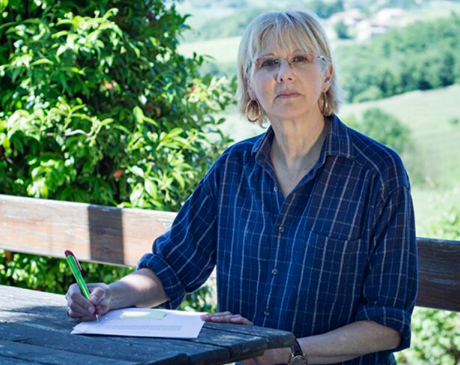Q & A: American Poetry
Q & A American Poetry: Lynn Emanuel

Here I comes. -Anne Lauterbach The book is the subject of the book.
-Edmond Jabes And I resented this: resented being called an American (and resented resenting it) because it seemed to make me nothing more than that, whatever that was; and I resented being called not an American, because it seemed to make me nothing.
—James Baldwin, Giovanni's Room
I think about my childhood fascination with my father sharpening his chisels against the stone wheel. The sudden static and crackle of sparks, white, cold, crisp, like carbonation that happened between the chisel and the wheel. It made me thirsty just looking at it. Once, wanting to feel that effervescence more deeply, inside me, in my body, I held the tip of my finger to the turning wheel. I watched myself ground down, I watched myself disappear behind the little safety glass window that automatically locked into place over the wheel.
Another gray day. I stoop again to the lathe of the sentence, the wheel turning, turning, noun and verb, subject and object, the perfect relentless form of it manufactured not by me but by the typesetter, the printer, by the white of the page itself. Currently, I am writing a book which is an allegory about the sentence and the page, an American allegory, an allegory of the village; I speak in an idiom, a dialect of landscape, my allegory won't let me travel beyond the national boundaries, perhaps it will not even travel beyond the boundaries of the island of a few readers. I persist in the myth of my own American anonymity, my hickishness and oaten oafishness. The very thing Poe railed against so brilliantly in his arguments for symbolism I cling to, I nurture into being, and it opens its eye on the page, in the blur of the terminal and stares at me. We look at each other, myself and the grave I have dug for myself.
I am not an internationalist. I find most of the formulations of the literary global village both dull and horrifyingly public. I want secrets, privacy, I want deposits of the inarticulate and incomprehensible, the queer, the recherche, the national. I want tension between and among specific, intact, intractable particularities, not the warm broth of internationalism that is often poured over everything by uniformed translation. All translation is ideological. I am suspicious of American forays into the literatures of other peoples. I am suspicious of how pleasant and accessible these literatures sound in American English, how available, naked, and transparent these "foreign" texts are. And how flabby, finally, my relation to them must be. There is no tension between their language and my own, there is nothing significant to wrestle with, like Jacob with the angel, no strange visitation, there is no tension, only the flaccid moment of familiarity and agreement: the world really is recognizable and friendly and available for my delectation and consumption.
I know enough about the mythologies of America to know how to inhabit one on the page, as I have here. In "real life" I have been reading Rosemarie Waldrop's extraordinary translations of Edmond Jabes and the tension between us, between Jabes and me, is palpable. I cannot receive Jabes except with respectful irony. Jabes writes about the landscape of the word and the page, the black figure on the white field as divine moment, a landscape out of time and place.
But this is America, no one can write about white and black, the page and the word, without also writing about the skin. That's why Jabes seems remote, strange. That's why he's the author I must enter into argument with. His page and his word are mystical, my page and my world are racial. This is America. I am I, the black word on the white page, I am inside that, I is inside me, my finger ruined by the lathe, the wheel, I type with a limp, heavy, soft, heavy, soft, the ruined stump, the severed foot, stalking the keys, stamping down the black word, I am the press, the typesetter, the type, the typist. I am the type, the specimen that is used to type all the others here on the page written inside America.
Published 1999.


